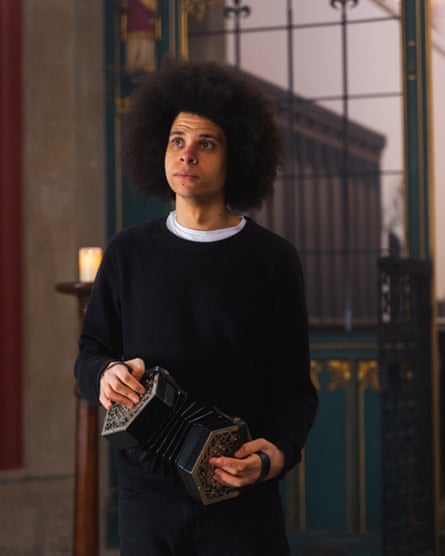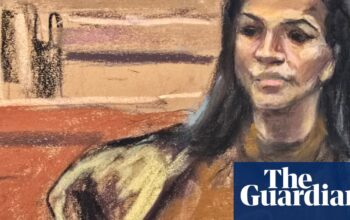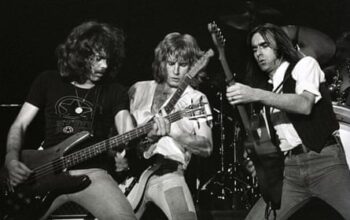On a sunny Sunday afternoon late in the festival season, a young musician is alone on stage with an older crowd in the palm of his hand. He plays a sailor’s hornpipe he composed that playfully references Bach, a music hall song once performed by Miss Piggy (“so I’m in fantastic company”), and then talks about being outbid on eBay on a book of folk songs from Barbados. “Then I found out who the bidder was – my mother!”
A tall 28-year-old concertina and melodeon player, Cohen Braithwaite-Kilcoyne is a veteran at Bromyard folk festival, which he first attended when he was 11: he’s from down the road, raised in Worcester and Birmingham. His new album, Play Up the Music!, explores the connections between Caribbean and Black American folk songs and British ones, the latest of a series of fascinating projects he’s been involved in over recent years.
These include a book of Gypsy and travellers’ songs, A Secret Stream, an album with Angeline Morrison and Jon Bickley called Grace Will Lead Me Home (exploring the history of the hymn Amazing Grace, written by the enslaver turned abolitionist John Newton) and performing with folk musician Reg Meuross on Stolen from God, a song cycle about the transatlantic slave trade in south-west England.
His Bajan maternal grandmother bought him his first concertina, he tells me when we meet in the site farmhouse before showtime. “I literally first saw and heard one here at Bromyard,” he says. “I was fascinated. It had such a distinctive, strident sound, and I loved the sense of fairground organ jollity about it.” He laughs, clearly self-aware that it’s an odd choice for a kid. “Plus I loved that it can do a lot. I like being a one-man band.”

Born in 1996, Braithwaite-Kilcoyne doesn’t come from a folk-loving family. His Rotherham-born white dad was an old “not particularly successful” punk: “His closest thing to a claim to fame is that he played in a band with the drummer from T Rex.” His Suffolk-born, Birmingham-raised mum had much more eclectic tastes, but he has now got her into folk too: she’s taken up the bodhrán drum and the whistle, and organises sessions and is forever looking for new songs to learn – hence pipping her son to that eBay sale.
Learning violin at primary school exposed Braithwaite-Kilcoyne to traditional British tunes, but a holiday to visit family in Barbados aged 10 also planted a seed. He heard a band playing traditional Bajan folk music, including a version of well-known English folk tune, The Keel Row, played on the steel pans. “I didn’t know it was traditional music then – it was played around more of the popular stuff known from there, reggae and ska on Trojan Records, all that wonderful stuff – but it stuck in my mind.”
He was reminded of it years later in 2020 when he was commissioned by the English Folk Dance and Song Society (EFDSS) to write a secondary school music resource on the theme of Black music in the Americas, helped in his research by online resources such as the US’s Library of Congress. He kept going with the search after that project ended. He ploughed through British folk that was centuries old but had been adopted by Black singers in countries thousands of miles away after these songs were taken to the Americas by colonists, settlers, and sailors – music that became “infused with the musical language of the singers that adopted them”, he writes in the album’s lucid sleeve notes, “morphing into something quite different to their English antecedents.”
After deciding to make an album of these songs, he was also at pains to include African American and Caribbean tunes that existed entirely separately from the English folk tradition, such as Cocoa Tea, about an elixir a woman gives to her old lover, and the instrumental Miss Bailey, based on a “woman’s banter song” popular in the landlocked parish of St George, Barbados, in the early 1900s. But Caribbean songs were harder to find generally, he tells me; that book his mother won on eBay, edited by Trevor Marshall, Peggy McCreary and Grace Thompson, was only published in 1981, and is one of the first examples of the music being collected.
“I had to turn to travellers-stroke-colonists-stroke-landowners who’d written records or diaries that provide lots of useful contextual background for some of the music making,” he says excitedly. “And in the 19th century there are records of things like English style country dances being held in the Caribbean where the band would often be mixed Black and white players, doing English country dance tunes.”
A book from 1907, Jamaican Song and Story, was also instructive, inspiring the album’s opening track, Tacoma’s Song. Written by a lapsed English clergyman, Walter Jekyll – a family friend of novelist Robert Louis Stevenson, Braithwaite-Kilcoyne points out, and an inspiration for the doctor in his Jekyll and Hyde novels – the book includes stories of the Jamaicans he employed. One of these, Tacoma and the Old-Witch Girl, featured two verses sung as a dialogue between the two main characters, which were similar to those from an English song, The Keys of Canterbury.
Popular British folk songs are also present in unusual versions, such as Outlandish Knight, sung over the decades by the likes of Martin Carthy, Norma Waterson and Kirsty Merryn. “Its melody is much more swung and syncopated than I’m used to, and there’s a couple of intervals in it that makes it feel to me like a calypso,” he says. Braithwaite-Kilcoyne is full of life talking about these connections. “I loved that my ancestors could have heard the same songs when they were young, even though they grew up in very different places and circumstances.”
As a young teenager of mixed heritage in the folk scene, Braithwaite-Kilcoyne was aware for a while of being an outsider, he says, but at 13 he was introduced to guitarist George Sansome and violinist Lewis Wood by a teacher, and they formed the band Granny’s Attic soon after. Now three albums into their career, they played their 15th anniversary concert at Bromyard last night. “We were the only three folkies in the school,” he laughs, “so thank god we met each other.”
Ever since, he’s been driven to show people the range of what his concertina and melodeon can do. His 2021 album Rakes & Misfits was full of tales of outcasts and eccentrics and music hall settings, and he also loves delving into the instruments’ baroque and renaissance music past, some of which he studied reading music at the University of Leeds (“the first squeezebox player to do so,” he says, with a touch of pride).
He’s now off on tour on his own, on trains as he doesn’t drive, with his two melodeons, concertina, amplifier and rucksack. Live, his versatility is clear as he performs a Napoleonic war song, Bold Carter, for his seven-year-old nephew and Broken-down Gentleman, a song that begins with a man reminiscing about being in his prime at 24 – the age Braithwaite-Kilcoyne turned during the Covid pandemic when he couldn’t play live. “Now I’m 28 and it’s all downhill from here,” he hams, as the crowd laugh and applauds. As the bright sound of his reeds fill the air, nothing could feel further from the truth.
Source: theguardian.com


